(published in the US as Radiant Angel)
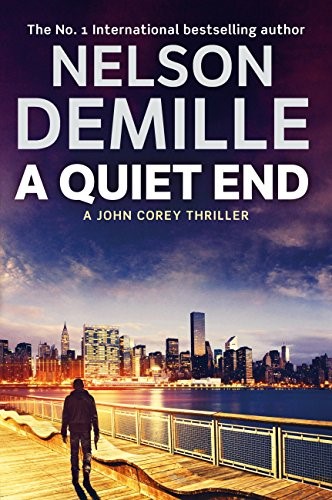
If you know thrillers, you will know the name of Nelson DeMille. He is one of those guaranteed bestsellers. He doesn’t write about Russia most of the time, but he has done occasionally both before and since the Soviet era.
The Charm School (1988) is a classic, with its scenes in the Soviet Union and its plot feature of KGB agents trained in a special area in Russia set up to simulate life in small-town USA. The Talbot Odyssey (1984), about Soviet agents in the CIA, is pretty good too. And DeMille’s non-Russian oeuvre is also above average in the thriller stakes —for example, from what I’ve read, The General’s Daughter (1992) and Word of Honour (1985).
A Quiet End comes decades later on from these best-sellers, and it shows in plot and style.
Published in the US under the better title Radiant Angel, A Quiet End is the 7th DeMille novel to feature lead character John Corey, former New York cop and FBI man. It fits into that category of long-standing thriller writer moving to slimmer and slighter fare than he wrote decades ago. Think Martin Cruz Smith’s later Arkady Renko novels (for example, Tatiana and The Siberian Dilemma) compared to the genre-defining Gorky Park. Like Martin Cruz Smith, Nelson DeMille continues of course to write well and produce best-selling page-turners. They are just not as substantial or surprising as his earlier work.
And plot-wise, even allowing for thriller writer’s licence, A Quiet End stretches things. Russia —and we are talking contemporary Russia here— decides, for reasons that are not at all clear, to obliterate New York with a suitcase nuke hidden in a yacht. And John Corey is the only man who can stop them.
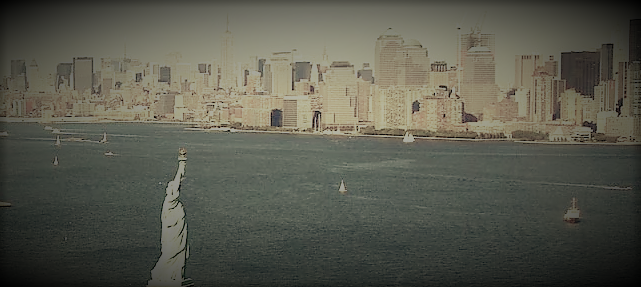
Is it a spoiler to say whether Corey manages to save the Big Apple? Not if you have ever read any US bestselling thrillers. Is it hackneyed that the suitcase bomb actually has a countdown mechanism so that we know how many minutes there are before it blows? Only if you have ever seen a Bond movie, a Stephen Seagal film, or, heck, any of a myriad others.
DeMille used to do more in the way of nuance than this. Corey is a man’s man, tough guy, conservative-thinking, attractive to women but struggling with commitment, rule-breaking, maverick, gun-toting hero. He brings to mind Stephen Coonts’s regular character Tommy Carmellini.
The set-up in this book is that Russia poses
an almost existentialist threat
A QUIET END, P. 24
It is clichéd stuff about big bad Russia, loose nukes, evil Russian president, and no real sense as to why Russia would ever find any geopolitical advantage in —let alone moral justification for— nuking New York.
The idea is that Russia, in the form of FSB Colonel Vasilii Petrov, plans the apocalyptic deed in such a way as to pin the blame on Islamist terrorists, using a yacht owned by a wealthy pro-Islamist Arab.
Strangely, the very same plot device appears in Daniel Silva’s The English Spy (2015), published within months of A Quiet End, where the Russian assassination of a British princess is designed to look as though Islamists had done it, by carrying it out on a yacht owned by a wealthy pro-Islamist Arab.
And Alex Berenson’s 2017 novel The Deceivers —the 12th in the John Wells series— also has Russia organising a terrorist attack in Texas in which hundreds of US citizens die in such a way as to make it look like Islamist terrorists are behind it.
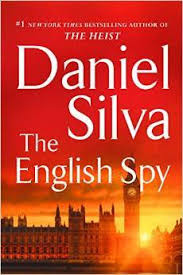
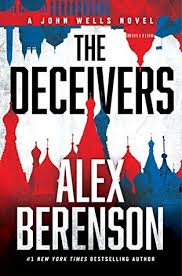
That three of the best-selling-est of all American thriller writers, within a couple of years of each other, develop plots along these same unlikely lines intrigues from the Russia-in-fiction perspective.
What lies behind it? It seems more than the expected idea that Russia makes a fine villain for US thriller writers. That could be —and is— done in more straightforward ways. For example, Jason Matthews’ Red Sparrow trilogy, and Karen Cleveland’s Need To Know (2018), and Tom Clancy and Mark Greaney’s Command Authority (2013), and Mark Greaney and Ripley Rawlings’s Red Metal (2019) — all these and many others manage to do ‘evil Russia’ without the Islamist go-between.
But to have Russia committing acts of mass terrorism against civilians and assassinating royalty by false-flagging Islamist terror groups smacks of wanting to drag contemporary Russia into places that it has not gone in the real world. Of course, it is fiction and it is for entertainment; and there is no doubt that DeMille, Silva, and Berenson entertain millions, myself included.
The sudden prevalence of the same very specific ‘use the Islamists’ Russia-in-fiction trope evidences and reinforces the return of Russia as the main enemy in some sections of US popular culture, taking back its traditional position usurped for a decade or so by other enemies and other sources of terror. And it comes with the hint that, hey, may be when those other sources of terror seem to act, it might well be those nasty Russians behind it all anyway.
Certainly for John Corey in A Quiet End, when it comes to comparing the Russians and Islamist terrorists, he
had no doubt who was the most dangerous
A QUIET END, p. 53
It is Russia.
Another character from one of the several confusing organisations which make up the US security structures, tells Corey
I tried to convince my colleagues that the Russian threat was not being taken seriously. The intelligence establishment and the military and diplomatic community are funneling vast resources into the war on Islamic terrorism because of 9/11. And they are ignoring the awakening bear.
A QUIET END, P. 90
The big bad Russia message is hammered home repeatedly and bluntly.
Petrov has always said, “Believe in yourself and believe in the cause of a new Russian Empire … it will be Russia that will stand on the corpses of Islam and the West. History is on our side”
…
Ten years ago … Russia had been broken, chaos ruled, and the people’s spirit was crushed. Now, under Vladimir Putin, the humiliation of defeat was being replaced by a new spirit of confidence, and Russia was again taking its rightful place in the world.
A QUIET END, PP. 110-111
As DeMille/Corey slightly ungrammatically puts it
the only thing that has changed since the days of the Cold War is the encryption codes
A QUIET END, P. 13
Except there are other differences too. That Russia is a far more open country that has junked its Communist ideology?
No, that their agents now eat healthy snacks …
Older FBI agents have told me that the Soviet KGB guys were mostly lardasses who smoked and drank too much. But the only kind of bars and clubs these guys from the new Russia were into were granola bars and health clubs. Their boss, bare-chested Putin, sort of set the new standard
A QUIET END, PP. 16-17
There are some familiar references to prove how bad the Russians are, for example the implied Litvinenko reference
the Russians had whacked dissidents all over the planet, including England
A QUIET END, PP. 24-25
And just in case we don’t get it, FSB Colonel Petrov is
A psychotic mass murderer
And Putin is described as a
megalomaniacal president, [who] yearns for the glory of the days of the Soviet Empire
A QUIET END, P. 92
Although none of A Quiet End is set in Moscow, the publishers have decided to end each chapter with a little outline drawing of St Basil’s, just to keep the Cold War thriller clichés coming.
Of course Russiainfiction.com doesn’t want to miss out on an excuse for a picture of St Basil’s.
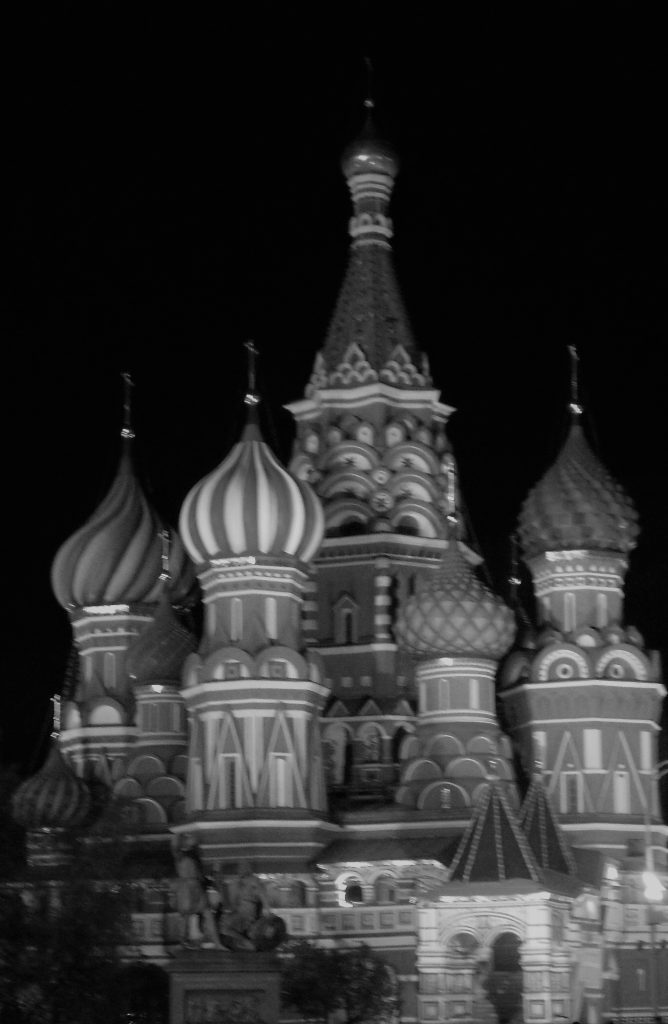
Still, may be this review is being a tad harsh here. It is fair enough for a thriller writer, who is after all writing entertainment not journalism, to set up Russia as the opponent. And putative enemies destroying New York City? H.G. Wells used this particular plot line as far back as his 1908 novel The War in the Air.
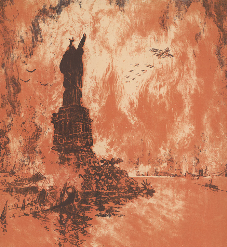
It is just that, in order to thrill, thrillers have to retain a basic credibility. H.G. Wells wrote with a degree of feasibility about the coming of aggressive German airpower. The idea of a psychotic mass murderer being tasked by Putin to set off a nuclear bomb in downtown Manhatten stretches credibility.
But, like Confessional by Jack Higgins (1985), A Quiet End has the strong selling point that it serves as a reminder of that Russia-in-fiction classic by Nelson DeMille, The Charm School. Russiainfiction.com will celebrate reaching its quarter-century of reviews by reviewing that particular favourite.